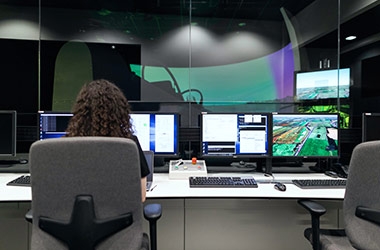Paper Based on Thesis by Wittenborg Staff Member Published in International Journal

Hanna Abdelwahab’s Study Analyses Students’ Perceptions of the Teaching of AI in Higher Education Institutions
Wittenborg Education Support Administrator Hanna Abdelwahab, Head of School of Business Rauf Abdul and associate professor Dadi Chen co-authored a paper that was recently published by international peer-reviewed journal ‘Industry & Higher Education’. Based on Abdelwahab’s master’s thesis, the study analyses how business students of Dutch higher educational institutions perceive their schools’ efforts in preparing them for Artificial Intelligence (AI) work environments.
Abdelwahab, who obtained her MBA degree in Education Management with honours from Wittenborg in 2020, explains that she was motivated to conduct research on the topic of AI because it has always intrigued her. “It baffles me how a machine can be taught to learn and mimic the human brain and emotions, but I guess my greatest enthralment is that AI has already permeated so many aspects of our lives and we do not even realise it. My question is, engineering and computer schools have AI as part of their curricula, but what about business, humanities or art schools? What is the value of business degrees if students are not prepared to work in an AI work environment?”
The research highlights that, in today’s world, artificial intelligence (AI) is embedded in many sectors of the economy, completely reshaping businesses and industries. Therefore, higher education institutions (HEIs) need to prepare students for this reality, helping them develop both hard and soft skills, including digital and data literacy competencies, communication skills and emotional intelligence. According to the authors, because higher education is a service and students are its main customers and stakeholders, listening to students can provide valuable insights into the quality level of the services offered to them. To conduct the investigation, Abdelwahab employed an online survey, relying on a sample of 95 final-year students and recent graduates from 27 Dutch HEIs, including research universities and universities of applied sciences.
Composed of both open-ended and closed-ended questions, the questionnaire addressed the students’ perceptions of four main factors: their own awareness of AI, schools’ teaching facilities, programme/curricula and the teaching of AI skills in the higher education institution. Among other conclusions, the study finds that although students know what AI is, they do not feel that their understanding is deep enough to provide them with the competencies and knowledge necessary to thrive in an AI work environment.
“One of the most important findings is the misconceptions that business students have about AI, by believing that they will not have to deal with AI in their career or in their work environments. It also reveals that business schools are not sufficiently equipped, in terms of resources and curricula, to prepare students for AI work environments,” Abdelwahab says.
As a response to these challenges, the authors offer a series of recommendations, stressing that higher education institutions should create more awareness about AI, its impacts and its great potential – especially in the business world – for students and academic staff. This can be achieved through the inclusion of specific AI-themed modules/courses in their curricula and the infusion of the topic of AI in all modules, as well as cross-disciplinary collaborations, integration among programmes and partnerships with other educational institutions, companies and government agencies.
According to the research findings, although it is not necessary for business students to know the technical aspects of AI like programming or coding, they should at least be equipped with digital/ICT literacy or ethical/cybersecurity awareness. “Higher Education Institutions should be well-equipped with the necessary physical and technological infrastructures, teaching staff and robust curricula. Wittenborg is a good example of this, because it is well aligned with the current trends by launching new specialisations such as the MBAs in Smart Industry and Data Science and implementing modules that specifically address the topic of artificial intelligence,” she points out.
Head of School of Business Rauf Abdul said that the study is not only relevant from an academic perspective, but also insightful for the industry and recent graduates. This is why, Abdul explains, he encouraged Abdelwahab to publish her work in an international peer-reviewed journal. “It took us some effort and time but it was worth working with two amazing colleagues as co-authors. I always look forward to publishing academic work with other colleagues, in line with Wittenborg’s mission of providing quality education and the school’s three pillars of ethics, diversity and internationalisation.”
WUP 23/8/2022
by Ulisses Sawczuk
©WUAS Press